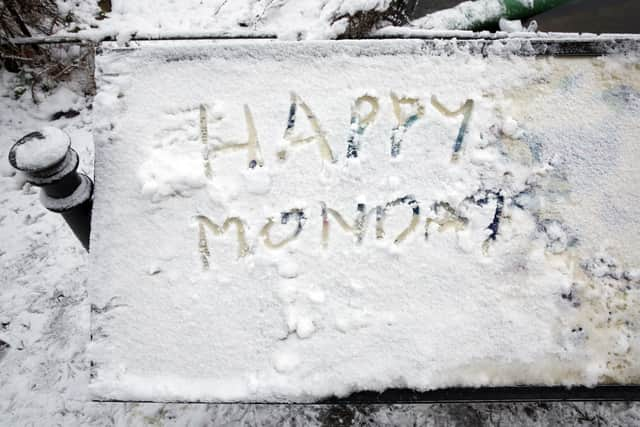Blue Monday 2024: when is third Monday in January in UK, what is it, meaning, date, definition - mental health
and live on Freeview channel 276
We’re now well into the new year, with two cold, wintery months still to come before the UK gets warmer and brighter.
Compared to all the festivities of December, January is usually a quiet month for most, and the year's next big party - Chinese New Year - is set to happen next month, so it’s likely you’ll be nursing an empty diary for much of the rest of January’s 31 days.
Advertisement
Hide AdAdvertisement
Hide AdBlue Monday is a term that has become synonymous with a specific date in January, often referred to as "the most depressing day of the year." On this day, we’re meant to have reached our lowest ebb of the entire calendar year.
Here is everything you need to know about it.
What are the origins of Blue Monday?


The concept of Blue Monday was first introduced in the mid-00s by British psychologist Dr. Cliff Arnall, who claimed to have developed a formula that took into account various factors contributing to the so-called "January blues".
These included weather conditions, debt levels, time since Christmas, and the failure of New Year's resolutions. The resulting date, typically the third Monday of January, was declared as the gloomiest day of the year.
The idea of Blue Monday quickly gained traction in the media, and has since become an annual event marked by discussions on mental health, well-being and strategies to combat the post-holiday slump.
Advertisement
Hide AdAdvertisement
Hide AdHowever, Dr. Arnall was actually asked to concoct a scientific formula for the January blues by holiday firm Sky Travel...
Is it all a marketing ploy?
The validity of Blue Monday as a scientifically established phenomenon has been widely debated, and critics argue that the concept lacks empirical evidence and is nothing more than a marketing ploy, often perpetuated by travel companies to boost sales during a time when people might be feeling down.
The timing of Blue Monday, conveniently positioned in the midst of winter, makes it an ideal opportunity for travel agencies to promote holiday packages as a remedy for the perceived January blues.
Sceptics say that the entire concept was orchestrated to create a sense of urgency for individuals to book holidays and escape the purportedly gloomy period.
Advertisement
Hide AdAdvertisement
Hide AdDoes it promote mental health awareness?
On the other hand, others argue that the Blue Monday concept holds merit in highlighting the challenges many people face in the post-holiday period.
Seasonal Affective Disorder (SAD), a form of depression that occurs seasonally, particularly in winter, is a real and documented condition.
The lack of sunlight during winter months can impact individuals' mood and energy levels, contributing to feelings of sadness and lethargy.
While Dr. Cliff Arnall's Blue Monday formula may not have been scientifically robust, it does draw attention to the broader issue of mental health struggles that can arise during this time of the year.
Advertisement
Hide AdAdvertisement
Hide AdHowever, psychologists and mental health experts warn that attributing a specific day as "the most depressing" oversimplifies the complex nature of mental health.
Depression and mood disorders are multifaceted conditions influenced by various factors, including genetics, environment and individual experiences, and people's responses to external factors like weather, debt or failed resolutions can vary significantly.
In recent years, efforts have been made to shift the narrative around Blue Monday. Mental health advocates and professionals encourage discussions that go beyond a single day of heightened awareness.
Instead, the focus should be on promoting year-round mental well-being, understanding the nuanced nature of mental health challenges and encouraging open conversations to reduce the stigma associated with seeking help.
When is Blue Monday 2024?
In 2024, Blue Monday falls on Monday 15 January.
Comment Guidelines
National World encourages reader discussion on our stories. User feedback, insights and back-and-forth exchanges add a rich layer of context to reporting. Please review our Community Guidelines before commenting.
